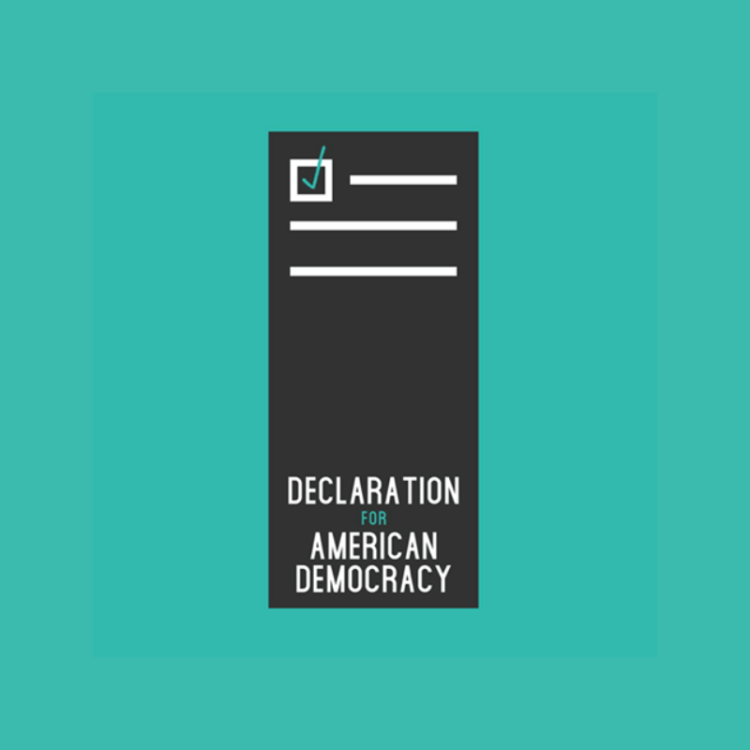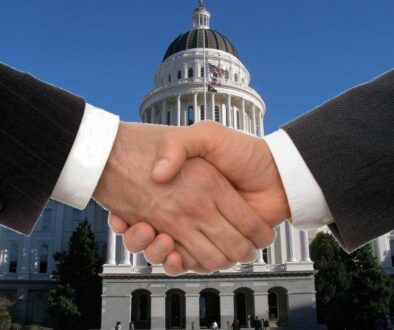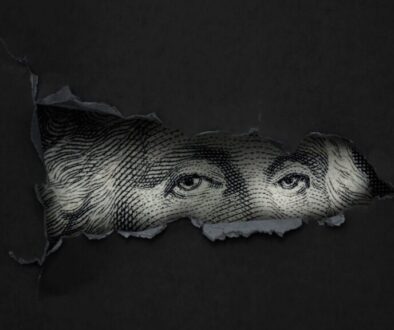But first, we must fix our democracy
The Declaration for American Democracy, a broad coalition of 100 national advocacy groups, officially launched last week to kick off its work to respond to the public’s calls for a democracy in which everyone can participate and every voice is heard. The new coalition’s efforts will focus on passing voting rights, ethics, and money- in- politics reforms that voters have been calling for throughout the 2018 midterm election cycle.
This new coalition expands past the organizations that have historically focused on money-in-politics and voting rights issues to include groups like National Security Action, Service Employees International Union (SEIU), NARAL Pro- Choice America, The National LGBTQ Task Force, the National Immigrant Justice Center, and Planned Parenthood. It’s clear why these groups have joined the campaign: the outsize influence of “big money” campaign spenders impacts Congress’ ability to make progress on most issues like safe access to abortion, LGBTQ+ equality, labor rights, immigration reform, health care, climate justice, and gun violence prevention reform.
Americans are witnessing the devastating effects of a presidential administration staffed almost exclusively by corporate insiders. The actions of Trump’s administration are the culmination of the president’s belief that corporations do not need to play by the same rules as regular Americans. If a regular American donates over $200 to a candidate, that information is available on the Federal Election Commission’s website for anyone to find. However, since the Supreme Court’s 2010 decision in Citizens United v. FEC corporations can secretly funnel large amounts of money through groups that don’t disclose their donors without their shareholders, customers, or the public ever knowing.
One reason spending large sums on elections is appealing to wealthy special interests is that it is a way to get their foot in the door with future lawmakers. By supporting a candidate’s run for office these donors are more likely to build a relationship that leads to better lobbying access down the road. Since regular citizens can’t come close to matching the large donations of corporate interests or super wealthy individuals this leads to lawmakers giving preference to big businesses and the richest “one- percent,” often at the expense of what is best for the voters.
The problem of money in politics is just getting worse. The 2018 midterms are on track to be the most expensive midterm election in history, with more than $1 billion coming from outside sources– meaning entities that are not directly coordinated with the candidates running for office. A particularly problematic subset of these outside spenders are organizations, mostly political nonprofits, that can receive unlimited corporate contributions, spend that money to influence the outcome of the election, while not being required to disclose their donors. Among the reforms being pushed by the Declaration for American Democracy are measures that would shine light on this secret money that is flooding our politics and require corporations to be honest about the money they spend to rig our democracy in their favor.
Playing in politics and policy making—particularly secretly—is not without its consequences for corporations. For example, AT&T came under public scrutiny after it was revealed that the company paid Trump’s attorney Michael Cohen, who has since pleaded guilty to multiple counts of fraud, $600,000 to consult on policy matters without disclosing that information to shareholders. Another example of a company facing public outcry for its political activity was when gun violence prevention advocates from Parkland, Florida staged “die- in” protests at two Publix supermarkets following reports that the company had made political contributions to Florida gubernatorial candidate Adam Putnam, who is an outspoken supporter of the National Rifle Association. Publix released a statement and halted its donations to Putnam following the protests. Although this activity was fully disclosed by Publix, this example illustrates the challenge companies currently face to ensure that their political engagement lines up with their stated corporate values and customer expectations.
The revelation of AT&T’s payments to Michael Cohen followed 5 years of calls from its shareholders to disclose the full extent of the company’s lobbying activity including payments for direct and indirect lobbying and oversight policies. And, shareholders have been calling on other major companies to disclose their political activity for years as well. Shareholder proposals about corporate political activity are one of the most frequently filed proposals every year, with 80 filed in 2018. In response to calls from their shareholders to be more transparent, many companies are voluntarily adopting accountability and transparency policies. Currently, more than half of the S&P 100 companies are disclosing some or all of their election- related contributions with corporate money. If a company chooses to engage in the policy making process for the sake of their business there should be no reason why they would want to hide that critical information from their shareholders and customers. However, these voluntary steps are not enough, these disclosures must be mandatory so that investors can understand potential risks to the company down the road—something called for by the Declaration for American Democracy.
Starting tomorrow, the coalition will begin a new campaign to ensure that Congress prioritizes democracy reforms in 2019. Increasing transparency around corporate engagement in politics is just one part of the Declaration’s plan to restore the balance to our democracy, which will also include protecting the right to vote, empowering small dollar campaign donors, and reducing the influence of wealthy special interests in our elections. While Americans are calling for policies that create an economy that is built for working people, address the impacts of climate change, establish affordable healthcare, and rebuild our infrastructure and schools, the “big money” campaign donor grip on our democracy stymies progress on all of these issues. Therefore, before we can solve the most pressing challenges facing the nation, we must ensure that our democracy works for all.
You can support the work of the Declaration for American Democracy by following it on Facebook and Twitter or check out the campaign website for all the latest updates.



